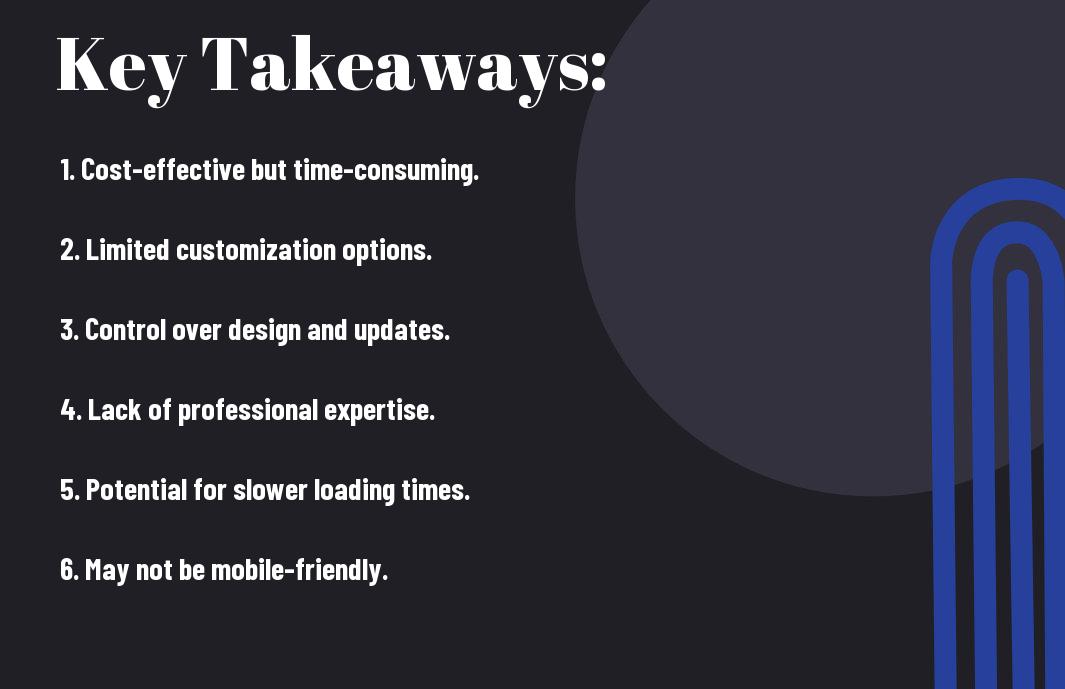Embracing the challenge of creating your own website can be a tempting and cost-effective option for small businesses. With an abundance of DIY website design tools available, the prospect of saving money and having creative control over your online presence can be enticing. However, before you dive into the world of DIY website design, it’s important to weigh the pros and cons to ensure that you are making the best decision for your business. While cost-saving and creative control are enticing advantages, there are also potential pitfalls such as lack of technical expertise, compatibility issues, and the time commitment required. In this blog post, we will explore the benefits and drawbacks of DIY website design to help you make an informed decision for your small business.
Key Takeaways:
- Cost Savings: DIY website design can save small businesses money by avoiding the high costs of hiring a professional web designer.
- Time Commitment: Creating a website on your own can be time-consuming, potentially taking away from other important tasks in running the business.
- Customization: DIY website design allows for greater control and customization of the website’s look and feel to align with the brand’s image.
- Expertise Required: Building a website requires technical knowledge and skills, which not all small business owners may possess.
- Professionalism and Credibility: A professionally designed website can lend more credibility to a small business, potentially impacting customer trust and conversion rates.

Understanding DIY Website Design
Your decision to design your own website comes with its own set of pros and cons. Understanding where DIY website design stands can help you make an informed decision that aligns with your business goals and resources. In this section, we’ll explore the fundamentals of DIY website design that will empower you to make the right choice for your small business.
What is DIY Website Design?
DIY website design refers to the process of creating a website on your own, without the assistance of professional web designers or developers. This typically involves using website builders, templates, and other tools to construct and customize your site based on your unique business needs and preferences. One of the main advantages of DIY website design is the autonomy it gives you to create, manage, and update your website without relying on external expertise. However, this autonomy also comes with its own challenges, as you need to familiarize yourself with the technical aspects and design principles of building a website.
Key DIY Website Design Platforms
When it comes to DIY website design, you have a plethora of platforms to choose from, each offering its own set of features, templates, and customization options. Platforms such as WordPress, Wix, Squarespace, and Shopify are popular choices for small businesses looking to design their own websites. These platforms provide intuitive interfaces, drag-and-drop functionality, and a range of templates to streamline the website creation process. However, it’s crucial to carefully consider the limitations and complexities of each platform, as well as the costs involved, to ensure that you select the best fit for your business.
Embarking on a DIY website design journey allows you to have full control over your website’s look and content. However, it’s important to recognize that it also comes with its own set of challenges and limitations including the time and effort required to learn the platform, potential technical issues, and the need for ongoing maintenance and updates. It’s essential to weigh the pros and cons of each platform to make an informed decision that aligns with your business goals and capabilities.

Advantages of DIY Website Design
Clearly, there are several advantages to taking on the design of your small business website yourself. If you’re considering this route, you’ll want to take a look at some of the strong points of this approach. For a more in-depth look at DIY website builders, you can check out What’s the best DIY website builder for small business? …
Cost-Effectiveness
By opting to design your own website, you can save a significant amount of money compared to hiring a professional web designer. This cost-effective solution allows you to allocate your resources to other areas of your small business, helping you stay within your budget.
Total Creative Control
When you design your own website, you have complete creative control over the look and feel of your online presence. You can customize every aspect of your site to reflect your brand’s identity and vision, ensuring that your website truly represents your small business in the best possible light.
No Need for Technical Expertise
With many DIY website builders, you don’t need to have a background in web design or coding. These platforms are designed to be user-friendly, allowing you to create a professional-looking website without having to possess extensive technical expertise. This gives you the freedom to focus on the content and overall design of your site.
Speed and Simplicity
Creating a website using a DIY platform can be a quick and straightforward process. Instead of waiting for a web designer to build and launch your site, you have the ability to do it yourself in a timely manner. Additionally, the intuitive interfaces of these platforms make the design process simple and user-friendly, allowing you to get your small business website up and running efficiently.
Challenges of DIY Website Design
Despite the many benefits of designing your own website, there are certain challenges you may face along the way. It’s important to be aware of these challenges so that you can make an informed decision about whether or not DIY website design is the right choice for your small business. If you’d like to further explore the pros and cons of DIY website builders versus custom designs, check out this article for more in-depth information.
Time Investment and Learning Curve
One of the main challenges of DIY website design is the time investment and learning curve. Building a website from scratch or using a website builder requires time and effort to learn the necessary skills. Depending on your technical abilities and the complexity of your website, this process can be time-consuming and challenging. Additionally, you may find yourself spending hours troubleshooting issues and learning new tools.
Limited Customization and Functionality
Another challenge of DIY website design is the limited customization and functionality options. While website builders offer templates and some degree of customization, they may not provide the level of control and flexibility that you need to fully represent your brand. This can limit your ability to create a unique and tailored online presence for your small business.
SEO and Visibility Concerns
When you choose to design your own website, you may encounter challenges with search engine optimization (SEO) and visibility. Effective SEO requires a deep understanding of keywords, meta tags, and other elements that impact your website’s ranking in search results. Without this knowledge, your website may struggle to attract organic traffic and reach your target audience.
Ongoing Maintenance and Updates
Lastly, DIY website design often requires ongoing maintenance and updates. As your business grows and technology advances, you’ll need to regularly update your website to ensure it remains functional and secure. This ongoing maintenance can be time-consuming and can distract you from other important aspects of your small business.
While DIY website design offers many benefits, it’s important to consider these challenges before moving forward. Understanding the potential obstacles can help you make an informed decision about whether DIY website design is the right choice for your small business.
By being aware of these challenges, you can better prepare yourself for the time and effort involved in DIY website design, and make an informed decision about whether it’s the right choice for your small business.
Considerations Before Choosing the DIY Route
Now, before you jump into designing your own website, it’s important to consider a few key factors. For a more in-depth look at the pros and cons of building a DIY website, you can check out our blog post The Pros & Cons of Building a DIY Website. This resource will give you a better understanding of what to expect when taking on this endeavor.
Analyzing Your Business Needs and Skills
When considering designing your own website, you should assess your level of expertise in web design and development. Do you have the skills needed to create a professional-looking and functional website? Additionally, you should evaluate your business needs and goals. Understanding what you want your website to accomplish for your business will help you determine if the DIY route is the best option for you.
Long-Term Impact on Business Growth
Another important factor to consider is the long-term impact of a DIY website on your business growth. While designing your own website may seem like a cost-effective solution in the short term, it’s essential to evaluate how it may affect your business’s perception and growth in the long run. A poorly designed and maintained website can potentially harm your brand’s reputation and hinder your overall business growth.
Support and Resources Availability
Finally, you should consider the availability of support and resources when choosing the DIY route for website design. Are you prepared to troubleshoot technical issues on your own, or do you have access to reliable support resources? Keep in mind that as your business grows, you may need additional features and support that DIY platforms may not be able to provide. Make sure you consider these aspects before making a decision.
The Pros and Cons of DIY Website Design for Small Businesses
The decision to design your own website has both advantages and disadvantages, and ultimately the choice comes down to what is most important for your business. On one hand, DIY website design allows you to have complete control over the creation and customization process, and can potentially save you money. On the other hand, it requires time, patience, and a certain level of technical skill. Additionally, the final result may not always match the professional look and functionality provided by a professional designer. When considering DIY website design for your small business, it’s important to weigh the pros and cons to determine if it is the best option for you.
FAQ
Q: What are the benefits of DIY website design for small businesses?
A: DIY website design allows small businesses to have control over their website’s design and content, saving on costs, and enabling quick updates and changes.
Q: What are the drawbacks of DIY website design for small businesses?
A: The drawbacks of DIY website design include potential lack of professional polish, limited technical capabilities, and the time commitment required.
Q: What are some popular tools for DIY website design?
A: Popular tools for DIY website design for small businesses include WordPress, Wix, Squarespace, and Weebly, among others.
Q: How can small businesses ensure a professional look with a DIY website?
A: Small businesses can ensure a professional look with a DIY website by choosing clean and modern templates, using high-quality images and content, and paying attention to details such as font choice and color scheme.
Q: Are there any alternatives to DIY website design for small businesses?
A: Yes, small businesses can also consider hiring a professional web designer or using website builder services that offer professional design assistance. These options may involve higher costs but can provide a more polished and customized result.
